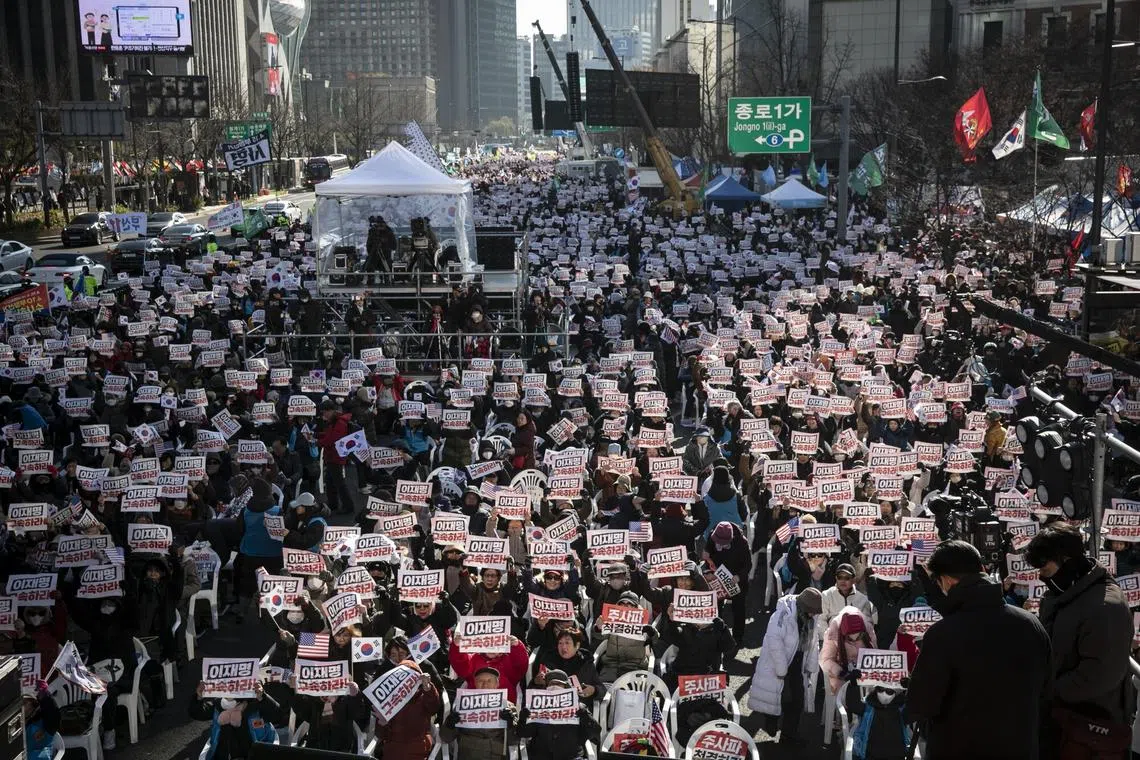S. Korea President Yoon Suk Yeol close to averting impeachment
Sign up now: Get insights on Asia's fast-moving developments
SEOUL - A motion to impeach South Korean President Yoon Suk Yeol was on the brink of failing on Dec 7, after lawmakers from his ruling party boycotted the ballot despite huge protests outside Parliament.
Mr Yoon stunned the nation and the international community on Dec 3 night by suspending civilian rule, but was forced into a U-turn
Opposition parties, which hold 192 seats in the 300-seat Parliament, filed the impeachment motion which needed 200 votes to pass.
But almost all 108 members of Yoon’s People Power Party (PPP) filed out of the chamber before the vote, prompting critical shouts from the opposition – with one yelling “where are you going?“ and others calling them “accomplices to insurrection”.
Only three PPP members cast ballots, but speaker Woo Won-shik stopped short of calling the result, appealing to PPP lawmakers to return “to protect the Republic of Korea and its democracy”.
The probable outcome is likely to enrage crowds – numbering 150,000 according to police, one million according to organisers – demonstrating outside Parliament for Mr Yoon’s ouster.
Demonstrators booed while some sighed or even wept in frustration as the ruling party lawmakers walked out of the chamber. Some protesters went home.
“Even though we didn’t get the outcome we wanted today, I am neither discouraged nor disappointed because we will get it eventually,” said Ms Jo Ah-gyeong, 30.
“I’ll keep coming here until we get it. I’d like to tell ruling MPs this: Please do your freaking job,” she told AFP.
Across town, thousands of pro-Yoon protesters gathered for a rally in Seoul’s main square.

Supporters of South Korean President Yoon Suk Yeol gather during a rally at Gwanghwamun Square in Seoul on Dec 7.
PHOTO: BLOOMBERG
Apology
Before the vote, Mr Yoon, 63, spoke for the first time in three days and apologised for the turmoil but stopped short of stepping down, saying he would leave it to his party to decide his fate.
“I caused anxiety and inconvenience to the public. I sincerely apologise,” he said in the televised address.
He said he would “entrust the party with measures to stabilise the political situation, including my term in office”.
The backing of PPP lawmakers came despite party head Han Dong-hoon – who was allegedly on an arrest list on Dec 3 night – saying Mr Yoon must go
‘Betrayal and anger’
If the motion does still pass, Mr Yoon would be suspended from duties pending a ruling by the Constitutional Court.
Opposition leader Lee Jae-myung said Mr Yoon’s comments on Dec 7 were “very disappointing”, given widespread anger among South Koreans.
His speech “only exacerbates the sense of betrayal and anger among the citizens”, Mr Lee said, adding the only solution was “the immediate resignation of the president or an early departure through impeachment”.
An opinion poll released on Dec 6 put backing for the president at a record low of 13 per cent.
“The public will not forgive him,” 63-year-old retiree Lee Wan-pyo told AFP at Seoul’s main train station before the vote.
“I just want him to step down,” said Ms Han Jeong-hwa, a 70-year-old housewife.
Detain politicians?
Regardless of the vote, police have begun investigating Mr Yoon and others for alleged insurrection.
In his address declaring martial law late on Dec 3, Mr Yoon claimed it would “eliminate anti-state elements plundering people’s freedom and happiness”.
Security forces sealed the National Assembly, helicopters landed on the roof, and almost 300 soldiers tried to lock down the building.
But as parliamentary staffers blocked the soldiers with sofas and fire extinguishers, enough MPs got inside – many climbed walls to enter – and voted down Mr Yoon’s move.
Soldiers had been ordered to detain key politicians, lawmakers from both parties have said, with the special forces chief later describing being given orders to “drag out” MPs from Parliament.
Experts and lawmakers have speculated that the elite special forces soldiers may have slow-walked following orders, after discovering themselves to be involved in a political rather than national security incident.
The episode brought back painful memories of South Korea’s autocratic past and blindsided its allies, with the US administration only finding out via television.
US Secretary of State Antony Blinken told his Korean counterpart Cho Tae-yul on Dec 6 that he “expects the... democratic process to prevail”. AFP


